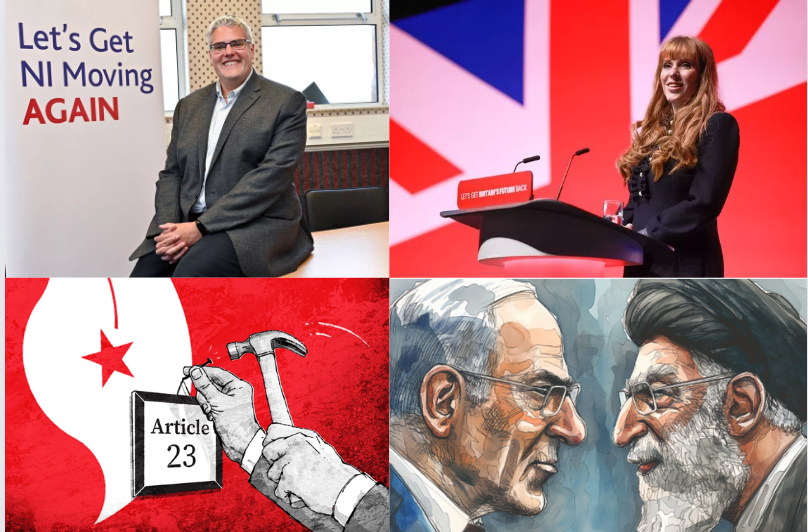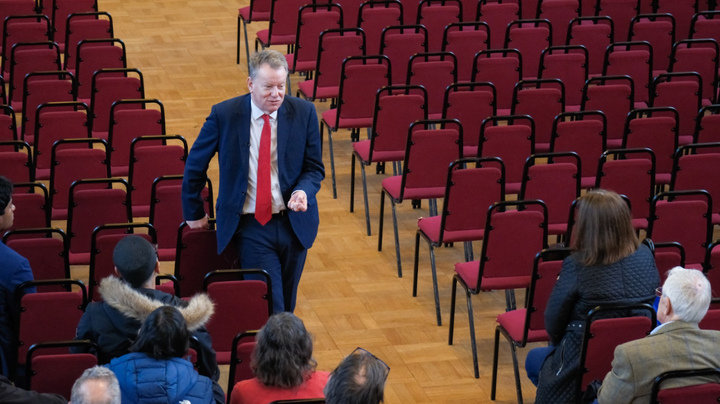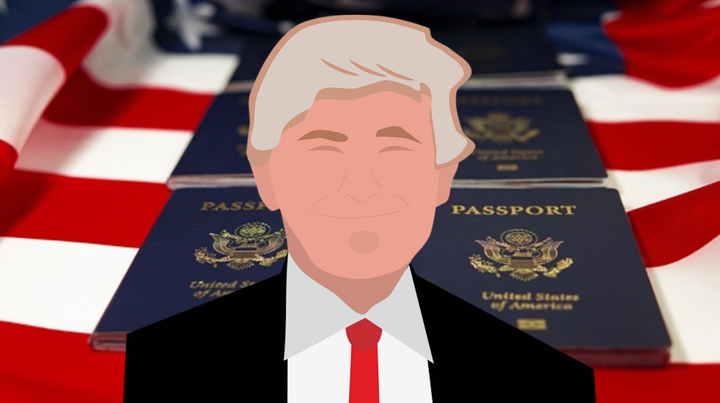The Perspective #03: March24

Donaldson and the DUP’s disaster
Shay Patel
On the 28th of March 2024, the leader of the Democratic Unionist Party was charged with the most serious crimes of rape and historic sexual offences. As the crimes came to light, Sir Jeffrey Donaldson resigned as the leader of the party, and was replaced with the new interim leader Gavin Robinson.
Donaldson is Northern Ireland’s longest-serving MP having been elected to Westminster in 1997 and recently took the initiative to steer his party back into government in Northern Ireland, effectively ending the 2-year boycott of Stormont (Northern Ireland’s dissolved parliament). Stormont had stopped sitting after the DUP backlash against the Northern Ireland Protocol.
Sir Jeffrey was at the peak of his power, and has now reached the nadir of his long career. It seems increasingly likely that Donaldson won’t be returning to Stormont let alone Westminster; he has left his party now with a mountain to climb.
The DUP have appeared in government before at Westminster; they entered into a supply-and-confidence agreement with Theresa May in 2017 under Arlene Foster after May failed to maintain a Conservative majority. Post-Brexit, they fail to show up in Westminster. Johnson’s snap-election of December 2019 diminished any hope of future influencing of the UK government.
Now that Donaldson has lost all credibility and respect, it falls to Gavin Robinson to weather the internal storm of the DUP and Northern Irish politics. Robinson has assured that the focus of the DUP will not change; it is to remain fixated on unionism, continue to serve for Northern Ireland and to voraciously contest for seats in Westminster in the impending general election.
Under the Spotlight: Angela Rayner's Council House Conundrum
Aditi Prashanth
Deputy Labour leader Angela Rayner faces allegations of providing false information, regarding her primary residence, to evade capital gains tax, igniting debates across the UK. Rayner purchased a discounted council home, on Vicarage Road, in 2007 and sold it in 2015, making a £48,500 profit, but a multitude of questions have arisen regarding her residency status during this period.
Despite being registered on the electoral roll at the Vicarage Road property, she listed a different (her partner’s) address for official purposes, raising questions, as under electoral rules, voters are expected to register at their permanent address and could face penalties for providing false information. Moreover, the fact that, under tax law, married couples who both have individual properties can only have one main residence between them further fuelled the confusion and mystique surrounding this situation.
Critics accuse Rayner of hypocrisy, as she advocates social justice and affordable housing while allegedly exploiting a system meant to assist those in need. However, supporters argue that she acted within legal boundaries and that personal finances should not overshadow her efforts to campaign for change in the housing sector. Moreover, Keir Starmer has highlighted his confidence in Rayner to the BBC, stating that he is “fully confident that Angela Rayner has not broken the rules.”, “she will cooperate with the investigation, as you would expect” and that we will expect to see her continue campaigning over the next few weeks.
Nevertheless, the situation presents challenges for Rayner, given her prominent position within the Labour Party. The controversy raises doubts about her commitment to addressing the housing crisis, particularly as housing affordability remains a pressing issue in the UK and Rayner faces mounting pressure to clarify her stance on housing policy amid the unfolding scandal. Furthermore, the outcome of this controversy could have significant implications for her political career and the broader discussions surrounding housing affordability in the UK.
Iran vs. Israel: a recent development in the Middle East
Juliette Hussey
Less than 24 hours ago, Israeli forces reported an attack from 300 “killer drones, ballistic missiles and cruise missiles” sent by Iran’s Islamic Revolutionary Guard Corps (IRGC) as a ‘punishment’ for what they labelled “the Zionist entity’s crime of targeting the Iranian consulate in Syria”
This raid on Iran’s embassy in Damascus on the 1st of April killed 13 people, including two senior generals in the IRGC’s elite Quds Force. Whilst Israel has not publicly confirmed its role in the raid, it has made no effort to deny it.
Today's attack appeared to be a public show on Iran’s part to establish deterrence and maintain an exterior of strength. However whilst it only led to minor damage to an Israeli military base, the most worrying thing to consider is the covert nature of this attack.
Many of the missiles appeared to be launched from Yemen and Iraq. Yoav Gallant, Israel’s defence minister warned that ‘the campaign is not over yet and’ stated Israel must ‘remain alert’. Furthermore, the fact that many of the missiles were shot down by RAF forces suggests an increasingly active British involvement in the Middle East.
Previously, Iran’s military action has been furtive and largely carried out through proxies. However, this outward display of hostility is near to unprecedented and it’s unclear what this could mean for conflict in an already unstable region and Iran’s escalating involvement in it.
Article 23
Krish Chaddha
On the 19th of March, Hong Kong passed Article 23 - a security law that has been advocated for, for coming up to 27 years. It has, however, faced mass criticism, particularly evident in 2003 when half a million Hong Kongers came out in protest against an earlier version of this law.
This law builds upon the National Security Law that China had implemented earlier, which criminalises terrorism and collusion with foreign forces, among other charges. Article 23 more specifically targets offences relating to espionage, insurrection and treason. Hong Kong’s Chief executive, the sole candidate approved by China for this role, John Lee claims that the law guards against ‘undercurrents that try to create troubles’.
Criticisms of the law stem from several of its components: one being that police have the right to detain suspects for up to 16 days without charge, which appears to encroach on basic human rights. The popular view of this law is that it attempts to further silence the dissenting voices in Hong Kong, and as Amnesty International’s China Director, Sarah Brooks, put it, it has ‘delivered another crushing blow to human rights in the city’.
Mere possession of a book critical of the Chinese party is now an offence. Regular everyday activities such as discussions of work with colleagues at lunch would perhaps constitute leaking state secrets if overheard. This sort of behaviour and fear fosters a climate of informant culture.




Comments ()